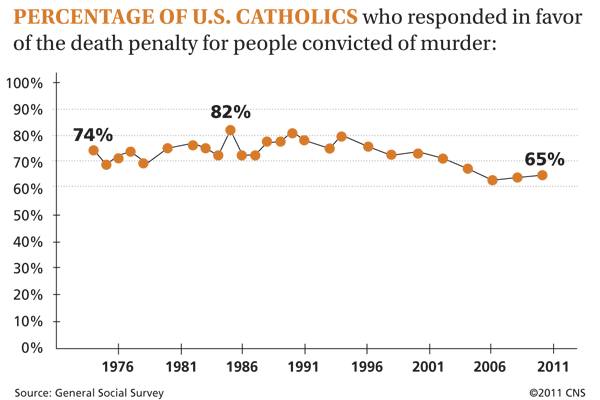HARTFORD, Conn. (CNS) — In what he called “a moment of sober reflection, not celebration,” Connecticut Gov. Dannel P. Malloy signed into law a bill outlawing the use of capital punishment in the state.
The law, which takes effect immediately, makes life imprisonment without the possibility of release the highest punishment possible in Connecticut. The death penalty could be carried out, however, in the cases of 11 prisoners currently on death row in the state.
Hailing the signing as a “historic occasion,” Archbishop Henry J. Mansell of Hartford said, “The Catholic Church opposes the death penalty and has been fighting for its elimination for many years.”
Bishop Stephen E. Blaire of Stockton, Calif., chairman of the U.S. bishops’ Committee on Domestic Justice and Human Development, praised the “courageous decision by the governor and the legislature” and said the bishops “stand in solidarity with all those who work for a just and safe society that protects its citizens and upholds the sanctity and dignity of all human life.”
Michael C. Culhane, executive director of the Connecticut Catholic Public Affairs Conference, noted that Connecticut now becomes the 17th state to abolish the death penalty.
“The conference is simply delighted to be part of this successful repeal effort which upholds a basic teaching of the church regarding the sacredness of human life,” he added.
The conference, representing the state’s bishops, had backed the legislation, saying, “Repealing the death penalty is in agreement with the pro-life teachings of the Catholic Church and is good public policy.”
Acknowledging that capital punishment is “a difficult issue for many Catholics,” especially when brutal crimes are committed, the conference said Pope Benedict XVI and the Catholic bishops nevertheless “call us to be faithful toward our church’s teaching on respecting the sanctity of all human life.”
“Justice can be served and society can be protected from violent criminals without the death penalty,” it added. “These goals can easily be met by replacing the death penalty with a lifetime sentence without the possibility of release.”
Malloy, a Democrat and a Catholic, signed the bill in a ceremony that was closed to the press and public but attended by about 30 people, including some members of the clergy who were not identified.
He called capital punishment “one of the most compelling and vexing issues of our time.”
“Many of us who have advocated for this position over the years have said there is a moral component to our opposition to the death penalty,” the governor said in a statement released after the signing. “For me, that is certainly the case. But that does not mean — nor should it mean — that we question the morality of those who favor capital punishment. …
“As the state moves beyond this divisive debate, I hope we can all redouble our efforts and common work to improve the fairness and integrity of our criminal justice system, and to minimize its fallibility,” Malloy said.
Connecticut is the fifth state in five years to end use of the death penalty, following legislative action in Illinois, New Mexico and New Jersey, a court decision in New York state and a moratorium declared by the governor in Oregon.
Voters in California are expected to decide in November whether the death penalty should be repealed there.







